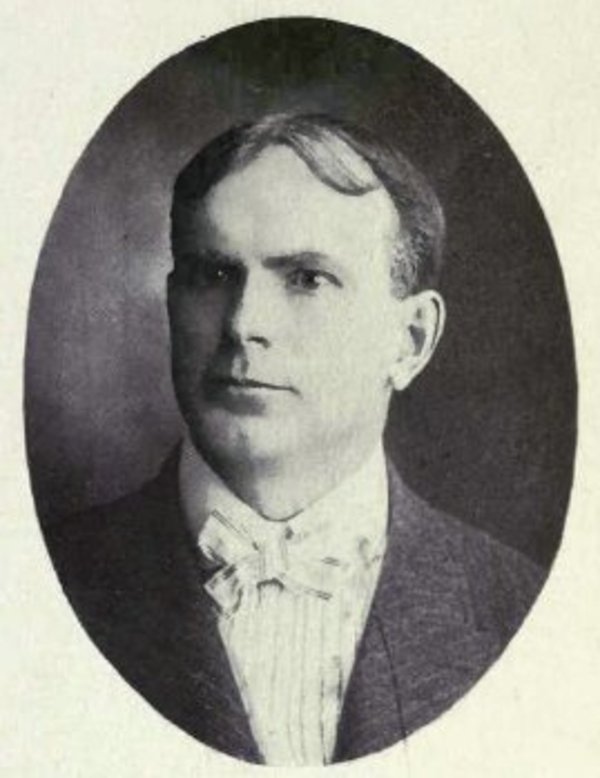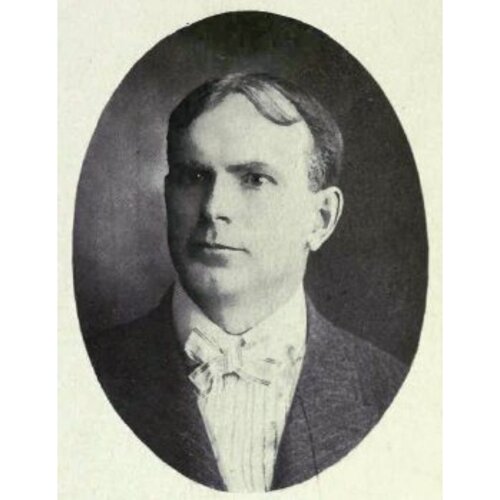
Source: Courtesy of Wikimedia Commons
McINNIS, STANLEY WILLIAM, dentist and politician; b. 8 Oct. 1865 in Saint John, N.B., son of John Lindsay McInnis and Mary Lewis Scottson; m. 8 June 1898 Clara Beckwith of Baltimore, Md; d. 4 Nov. 1907 in Brandon, Man.
Stanley William McInnis received his early education at an elementary school in Fredericton. His family moved to Manitoba, where his father became a schoolteacher and customs official. In 1880 McInnis entered Manitoba College, Winnipeg, and he graduated with a ba.
After working a short time for Winnipeg businessman James Henry Ashdown*, McInnis began his dental training by apprenticeship to James Lee Benson of Winnipeg. He then studied at the Philadelphia Dental College and graduated dds on 24 Feb. 1888. Following his return to Manitoba, he received his lds and set up practice in Brandon in 1889 as the province’s first college-educated dentist. At times he attended to patients in the nearby towns of Virden, Minnedosa, and Neepawa, bringing his dental equipment with him.
McInnis was a founding member of the Canadian Dental Association, established in Montreal in 1902, and he became its first registrar. At its initial meeting he expressed concern about the lack of a national standard of qualification for dentists. He moved the formation of a council, whose members, nominated by the provincial dental associations, would establish a national standard, acceptable to all provincial licensing boards. Later, he served as president of this body, the Dominion Dental Council. Although not all provinces joined, national examinations began to be held by the council in 1906. The first Manitoban dentist to be president of the Canadian Dental Association, in 1906–7, McInnis was twice president of the Manitoba Dental Association, in 1889–99 and 1905–7. For many years he was a contributing editor of the Dominion Dental Journal.
McInnis’s interests extended far beyond dentistry. When the Sanatorium Board of Manitoba was established by the provincial government in 1904, he was one of its members and was a strong supporter. He helped raise nearly $50,000 in private subscriptions for the building of a sanatorium. The provincial Board of Health sponsored a voluntary organization of persons interested in the sanatorium movement. McInnis was a member in 1906.
Active in civic affairs, McInnis served as a director of the Brandon Board of Trade and organized the Brandon Fire Assurance Company. He was also a director of the Western Agricultural and Arts Association of Manitoba. An outdoorsman whose love of nature and enjoyment of duck hunting was demonstrated by his presidency of the Provincial Game Protective Association, the Brandon Horticultural Society, and the Brandon Gun Club, he was also greatly interested in sports, holding office as president of the Brandon Athletic Club and the Brandon Turf Club.
On 7 Dec. 1899 he was elected as an independent Conservative to represent Brandon City in the Legislative Assembly of Manitoba. A supporter of Hugh John Macdonald* and his successor as premier, Rodmond Palen Roblin*, McInnis was re-elected in 1903 and 1907. In the assembly he proved to be an accomplished debater and demonstrated considerable knowledge of public affairs. His wit was used effectively, occasionally at the expense of the opposition. The postcard caricatures he made illustrated the same sense of humour. On 1 March 1902 McInnis was elected acting speaker of the assembly. He served as municipal commissioner from March 1907, and in June that year was appointed provincial secretary with responsibility as well for the Department of Education.
An Anglican and a member of the British Club, he was known as a good-natured, generous, and hospitable man. When staying in a hotel, he would occasionally entertain fellow guests with comic songs. The Brandon Opera Society also benefited from his baritone voice.
Stricken with appendicitis, McInnis was operated on in early November 1907. Blood poisoning set in, however, and he died three days later. On his deathbed he delivered a message to the people of Brandon explaining that he had sought to be useful to the city. In it he advocated a number of civic improvements, including government support for hospitals so that they would not be dependent on public charity, the establishment in Brandon of a public school for the benefit of Ruthenian (Ukrainian) immigrants, and increased spending on parks and works of art. His body lay in state at Brandon City Hall and, following a service at St Matthews Church, it was interred in the family plot at Brookside Cemetery, Winnipeg. Stanley Park in Brandon was named in his honour shortly after his death.
Brandon Daily Sun (Brandon, Man.), 4, 7 Nov. 1907. Manitoba Morning Free Press, 4, 6 Nov. 1907. Bryce, Hist. of Man. Canadian annual rev. (Hopkins), 1907. Ralph Crawford, “Did you know: notes on Manitoba’s dental history,” Manitoba Dental Assoc., Bull. (Winnipeg), 7 (1988), no.2: 4. “Hon. S. W. McInnis, d.d.s.,” Dominion Dental Journal (Toronto), 19 (1907): 437–39. Pioneers of Man. (Morley et al.).
Cite This Article
I. I. Mayba, “McINNIS, STANLEY WILLIAM,” in Dictionary of Canadian Biography, vol. 13, University of Toronto/Université Laval, 2003–, accessed December 12, 2025, https://www.biographi.ca/en/bio/mcinnis_stanley_william_13E.html.
The citation above shows the format for footnotes and endnotes according to the Chicago manual of style (16th edition). Information to be used in other citation formats:
| Permalink: | https://www.biographi.ca/en/bio/mcinnis_stanley_william_13E.html |
| Author of Article: | I. I. Mayba |
| Title of Article: | McINNIS, STANLEY WILLIAM |
| Publication Name: | Dictionary of Canadian Biography, vol. 13 |
| Publisher: | University of Toronto/Université Laval |
| Year of publication: | 1994 |
| Year of revision: | 1994 |
| Access Date: | December 12, 2025 |



